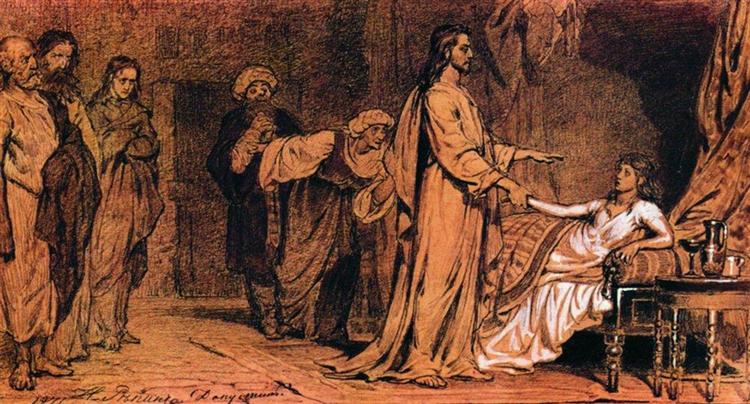Beskrivning
Ilya Repin, one of the most prominent artists of the 19th-century Russian realist movement, masterfully captures in “The Resurrection of Jairus’ Daughter” (1871) a dramatic moment that transcends time and space. This work, which recalls the biblical narrative of the Gospel of Mark, becomes a vehicle for exploring the complexity of human emotions, faith and wonder. With a refined technique, Repin transports the viewer to an intense scene, where the expressions and gestures of the characters give a powerful identity to the painting.
The composition of the work is finely balanced, generating a visual focus that guides the viewer’s gaze from the central figure to the surrounding environment. At the heart of this scene is the figure of Jairus’ daughter, reclining on a bed, her depiction evoking both fragility and a glow of life. Repin uses a remarkable chiaroscuro that highlights the whiteness of the young girl’s body, symbolizing not only her physical fading, but a hope for resurgence. Around her, the characters reflect a range of emotions, from hope to anguish, that capture the uncertainty of the moment; the father, Jairus, is presented with gestures of despair, while the observers around him are caught in a mix of restlessness and longing.
The palette used by Repin is rich and vibrant, dominated by terracotta tones and deep blues that create a dramatic contrast with the luminosity of the young woman's body. Each colour has a purpose and contributes to the emotional atmosphere of the work. The choice of lighting is also fundamental; subtle flashes of light seem to emanate from the central figure, suggesting a connection between the human and the divine, emphasizing the miracle that is about to be depicted.
The characters surrounding Jairo are equally introspective in their expressions. Several women, probably family members or friends, can be seen expressing anguish and wonder. The richness of their clothing, the subtle folds and attention to detail in their facial features reflect Repin’s mastery of portraiture, a skill he would develop throughout his career. Over the years, Repin excelled at capturing the essence of humanity, and here is no exception; each figure seems to have its own story, its own pain and hope.
This painting is inserted within an artistic context where realism sought to represent life as it is, without idealizations, and at the same time, to give a deep emotional meaning to the subjects treated. The work can be compared with other religious paintings of the time, such as those of his contemporary, the French painter Jules Bastien-Lepage, who also sought to emphasize the reality of human existence through his art. However, Repin specializes in the drama of the scene by amalgamating the narrative with a deep sense of human feelings, using his talent to capture the soul of his characters.
“The Resurrection of Jairus’ Daughter” is not only a commentary on a biblical passage, but an exploration of the fragility of life and the unwavering strength of faith. Through this work, Repin invites the viewer to confront their own emotions and reflections on what life, death, and what lies beyond the visible mean. The thematic depth, coupled with the artist’s masterful technique, makes this painting a masterpiece of realism, resonating with audiences of its time and continuing to do so today. Thus, rather than simply portraying a moment, Repin captures the eternity of suffering, hope, and redemption.
KUADROS ©, a famous painting on your wall.
Hand-made oil painting reproductions, with the quality of professional artists and the distinctive seal of KUADROS ©.
Painting reproduction service with satisfaction guarantee. If you are not completely satisfied with the replica of your painting, we will refund 100% of your money.

